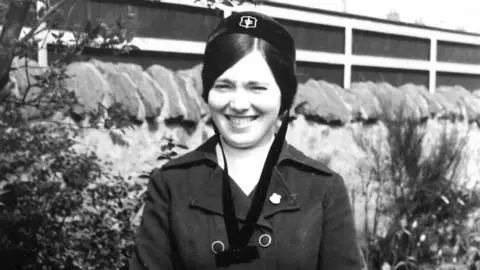Victims' pension: Troubles fund 'rejected if paramilitaries eligible'
The family of a former soldier left brain-damaged by a bomb 40 years ago said they will not accept a Troubles-related pension if injured ex-paramilitaries also receive one.
County Fermanagh man Grant Weir was injured when the IRA attacked his Ulster Defence Regiment (UDR) patrol.
The victims' commissioner has said people badly injured in the Troubles should be able to apply for a pension.
That includes those who were hurt while carrying out attacks.
The commissioner, Judith Thompson, has advised the government on the issue and acknowledges there are political sensitivities around eligibility.
 Weir family
Weir familyShe gave her advice to the government in May, but it has only now been made public.
The legislation would help people who have been unable to work and earn their own pension due to severe and permanent physical and psychological injuries as a result of the conflict.
Mr Weir suffered his injuries when the IRA detonated a bomb as his patrol drove past a bus stop near Rosslea in County Fermanagh on 17 July 1979.
Sylvia Crowe, a church missionary who was waiting at the bus stop with two other women, was killed.
'Beyond belief'
Mr Weir, who was 22 when he was attacked, is cared for by his family, including his sisters Debbie Palmer and Michele Nixon.

"From the moment that bomb went off, that changed our lives forever, and has affected three generations of our family," said Mrs Nixon.
A victim's pension would "make a massive difference" to the family, said Mrs Palmer.
"Financially it would definitely allow us to help out with Grant a great deal," she said.
"However, if that also meant that potentially the... people responsible for blowing up Grant... would have an entitlement to that same pension... it's beyond belief.
"As a family, we would never accept a payment if it meant that the people who went out to destroy lives, destroy families, were to be put into the same category... as Grant, whose life they have destroyed."
 Crowe family
Crowe familyLast month, the government said it was examining the victims' commissioner's advice about the pensions.
Mrs Thompson said the advice was a "fair and reasonable response" to support those who had suffered greatly.
More than 3,600 people were killed during three decades of sectarian conflict in Northern Ireland and a further 40,000 were injured.
Campaigners have been calling for some time for a pension for those severely injured during the Troubles to be introduced.
What does the advice say?
It states that recipients should be people who have been unable to work or earn their own pension due to a conflict-related injury.
It would also allow for the pension to be passed on to a spouse, dependent or carer for their lifetime.
 Pacemaker
PacemakerIt states that an independent assessor would look at applications and that payments should be made based on the severity of the impact of an individual's injury.
It recommends backdating payments to 2014, when the political parties and the government formally recognised the need for a pension through the signing of the Stormont House Agreement.
Who would be eligible to apply?
The advice refers to the Victims and Survivors (NI) Order 2006, which makes no distinction between paramilitaries who were killed or injured and victims.
Under the order, a victim is defined as:
- Someone who has been physically or psychologically injured as a result of a conflict-related incident;
- Someone who provides a substantial amount of care on a regular basis for a person who has been physically or psychologically injured as a result of a conflict-related incident;
- Someone who has been bereaved as a result of a conflict-related incident.
The order has proved controversial, with failed attempts by unionist politicians to change the definition of a victim.
They argue that perpetrators of violence and those injured by their own hand should not be eligible for a pension.
However, other parties at Stormont have previously insisted there should be "no hierarchy of victims".
What is likely to happen next?
The commissioner is urging Westminster to legislate for the pension in the absence of devolution at Stormont.
Northern Ireland has been without a government since the assembly collapsed in January 2017.
Several MPs and peers had tabled amendments relating to a pension to a Northern Ireland bill currently going through Parliament, but the government insists it is still considering the issue.
Mrs Thompson said the government "cannot kick this issue down the road any longer".
